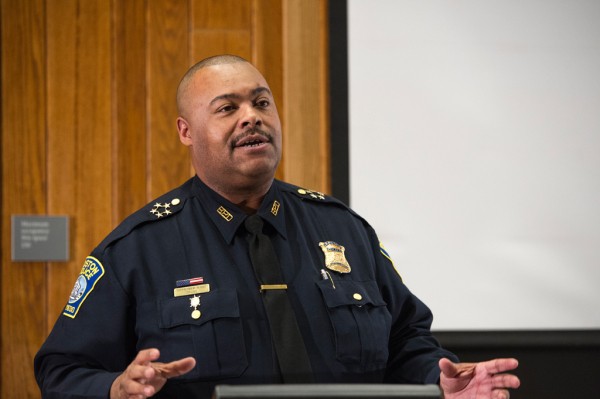
BPD Chief William Gross addresses the BC Social Work community.
This year’s Diversity & Justice and Alumni Awards Conference addressed a topic that has become a focal point for much of our nation’s conversation around race, that of community policing, while engaging the perspective of a national leader, Boston Police Department (BPD) Superintendent-in-Chief William Gross.
The first African American chief in the history of the BPD, Gross focused his remarks around his personal history as a police officer that experienced his own challenges being a black cop in Boston, and how that understanding has helped him to nurture connections with members of the community who often maintain a conflicted relationship with the police (watch the video of Gross’ talk on our YouTube channel).
“When you go back to a neighborhood that thought you were crazy to be joining a police department in the first place, you have to show that you remember history, both negative and positive, and that you’re willing to make a change,” said Gross. “I’ve been called Uncle Tom, I’ve been called sellout, from other parties I’ve been called the ‘n word’ but either way, when you put this uniform on, you’re serving the public, and you have to be willing to listen and make effective changes.” This mantra has become a major part of his mission, and it’s why the BPD is respected nationwide for its innovative approaches to community policing.
Born in a farming community in Maryland, Gross moved to Boston at the age of 12, in 1975, right in the middle of the busing crisis, an event he said had a major impact on him, and his understanding of freedom, in a world where “you can’t go here, you can’t go there because people don’t like you.” Growing up in Dorchester, “a tough neighborhood with good people,” he soon learned that the term “parents” extended well beyond the nuclear family, to include community members.
“I learned from my ‘parents’ about relationships … and how you may be perceived and stereotyped, and how you may stereotype others,” he said. But most critically to his current work, he learned a lot about existing adversarial relationships between people of color and the police. He has since translated those historical perspectives into his current work seeking to bridge the gap between these communities and BPD.
One example of this policy surrounds recent demonstrations around the Black Lives Matter movement, to which Gross remarked, “In Boston, we believe in the First Amendment, you have a right to protest, or I wouldn’t be here as the first African American chief.” That’s why he tells protest organizers to do their thing, as long as they engage in constructive dialogue instead of destructive behavior. “I’m proud of the protestors in Boston,” he says.
In addition to a new overall perspective of openness that Gross has worked so hard to cultivate between his department and the people of Boston, the BPD and its partners have instituted a variety of programs with community policing and social justice in mind. These include:
- Operation Ceasefire – a program to curb youth violence and offer alternatives to the gang lifestyle, which engages key stakeholders including the BPD, other law enforcement agencies, prosecutors, probation officers, and community members.
- Operation Homefront – a collaboration between the School Police Unit, Youth Violence Strike Force, Boston Public School Police, and the community (in particular, faith-based organizations) that seeks to establish the family as “the first line of defense” against gang violence and criminal activity among youth.
- YouthConnect – a partner initiative with the Boys and Girls Club of Boston, YouthConnect places social workers in BPD district stationhouses and specialized units to work with at-risk youth and their families. YouthConnect’s Executive Director, Andrea Perry (MSW ’99) was a respondent to Chief Gross’ remarks.
Perry and fellow respondent Melanie Robinson Findlay (MSW ’09), who is Mental Health Director at the Suffolk County House of Correction, provided informative on-the-ground perspective about what it means to be a person of color negotiating a complex understanding of the role of the police officer, who Perry called, “the one you love to see and hate to see at the same time.”
Undoubtedly, Chief Gross is hopeful that perspectives are beginning to change, so that more Bostonians look to the police officer as “the one you love to see.” He’s hard at work to try and make that a reality.
Distinguished alumni awards were also presented during the day’s events. This year’s awards were presented to Daniel Gill (MSW ’06) and Judith S. Willison (MSW ’87).

